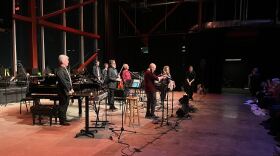In this era of urban agriculture, Milwaukee is making a name for itself as a leader. At the same time, a group tuned into the dangers of lead in the soil wants to use the urban farming wave to inform families.
In Milwaukee, an estimated 10 percent of kids under age six have unhealthy levels of lead in their blood - levels that could cause permanent brain and nervous system disabilities.
A major culprit has been the lead-based paint used on houses decades ago. Those paint chips can also make their way into family gardens.
The local project Growing Healthy Soil for Healthy Communities aims to reduce the risks.
Midway into a five year grant, 275 people have participated in its environmental health literacy workshops.
A dozen people recently gathered under a wooden canopy in a lush neighborhood garden on Scott Street on the city's south side for a two hour session.

Alejandra Hernandez is about to get the program rolling. “A lot of the people that are here we met during door to door outreach with the lead outreach program,” she says.
Hernandez works with Sixteenth Street Community Health Centers. It has a long history of helping families tackle the hazards of crumbling lead-based paint because of the devastating developmental impacts it can have on children.
The Center is tracking more than 1,200 at-risk families on the south side.
Now it’s encouraging them to learn more about their soil – another possible contamination site.
As the evening workshop begins, Hernandez introduces the adults to dangers of lead. The idea is to inform – not terrify. Attendees have plenty of questions. A dad wants to know the best time to test his young children for high lead levels.

Hernandez takes time to answer each question thoughtfully, before she leads half of the group to a garden plot, where she demonstrates how to gather soil samples at home.
“When you’re doing your soil collection try not to get any of the green material or any mulch,” she says.
Families who decide to can return them to Hernandez. It’s the step she hopes they take.
It was elevated lead samples in several Milwaukee neighborhoods and conversations among partners starting in 2010 that fueled the creation of this program, Growing Healthy Soil for Healthy Communities.
"People eat a lot more soil than they think they do. So when you're involved, anywhere where there's bare ground - bare soil - gardening, playgrounds without grass growing on them... you can be exposed that way. And kids more so than adults." - Geoff Siemering, UW-Extension Soil Science Department
Sharon Morrissey heads the UW-Extension’s master gardener program for Milwaukee County and says there is plenty to convey about lead in our outdoor environments.
“People have some misconceptions and don’t think of it being in most of the soil in Milwaukee and that it gets on your shoes, and it gets on your hands and it gets on your clothes. And then you track it in and your kids get it on their hands, and the babies get it in their mouths, so it’s really important to important to learn ways to keep that from happening.” Morrissey says.
As the evening draws to a close, the attendees leave for home with soil sample kits, gardening gloves and other goodies.
I later learn that of the 12 attendees, only two submitted soil samples. Workshops don’t always result in high yields.
So far, 33 families – some on the north, most on the south side – have jumped aboard completely.













